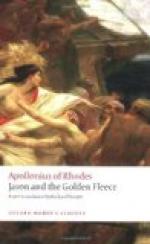[Footnote 1: The allusion is to Sesostris, see Herod, ii. 102 foll.]
[Footnote 2: Or, reading [Greek: hemeteren], “into our sea.” The Euxine is meant in any case and the word Ionian is therefore wrong.]
Thus he spake, and to them the goddess granted a happy portent, and all at the sight shouted approval, that this was their appointed path. For before them appeared a trail of heavenly light, a sign where they might pass. And gladly they left behind there the son of Lycus and with canvas outspread sailed over the sea, with their eyes on the Paphlagonian mountains. But they did not round Carambis, for the winds and the gleam of the heavenly fire stayed with them till they reached Ister’s mighty stream.
Now some of the Colchians, in a vain search, passed out from Pontus through the Cyanean rocks; but the rest went to the river, and them Apsyrtus led, and, turning aside, he entered the mouth called Fair. Wherefore he outstripped the heroes by crossing a neck of land into the furthest gulf of the Ionian sea. For a certain island is enclosed by Ister, by name Peuce, three-cornered, its base stretching along the coast, and with a sharp angle towards the river; and round it the outfall is cleft in two. One mouth they call the mouth of Narex, and the other, at the lower end, the Fair mouth. And through this Apsyrtus and his Colchians rushed with all speed; but the heroes went upwards far away towards the highest part of the island. And in the meadows the country shepherds left their countless flocks for dread of the ships, for they deemed that they were beasts coming forth from the monster-teeming sea. For never yet before had they seen seafaring ships, neither the Scythians mingled with the Thracians, nor the Sigynni, nor yet the Graucenii, nor the Sindi that now inhabit the vast desert plain of Laurium. But when they had passed near the mount Angurum, and the cliff of Cauliacus, far from the mount Angurum, round which Ister, dividing his stream, falls into the sea on this side and on that, and the Laurian plain, then indeed the Colchians went forth into the Cronian sea and cut off all the ways, to prevent their foes’ escape. And the heroes came down the river behind and reached the two Brygean isles of Artemis near at hand. Now in one of them was a sacred temple; and on the other they landed, avoiding the host of Apsyrtus; for the Colchians had left these islands out of many within the river, just as they were, through reverence for the daughter of Zeus; but the rest, thronged by the Colchians, barred the ways to the sea. And so on other islands too, close by, Apsyrtus left his host as far as the river Salangon and the Nestian land.
There the Minyae would at that time have yielded in grim fight, a few to many; but ere then they made a covenant, shunning a dire quarrel; as to the golden fleece, that since Aeetes himself had so promised them if they should fulfil the contests, they should keep it as justly won, whether they carried it off by craft or even openly in the king’s despite; but as to Medea—for that was the cause of strife—that they should give her in ward to Leto’s daughter apart from the throng, until some one of the kings that dispense justice should utter his doom, whether she must return to her father’s home or follow the chieftains to the land of Hellas.




